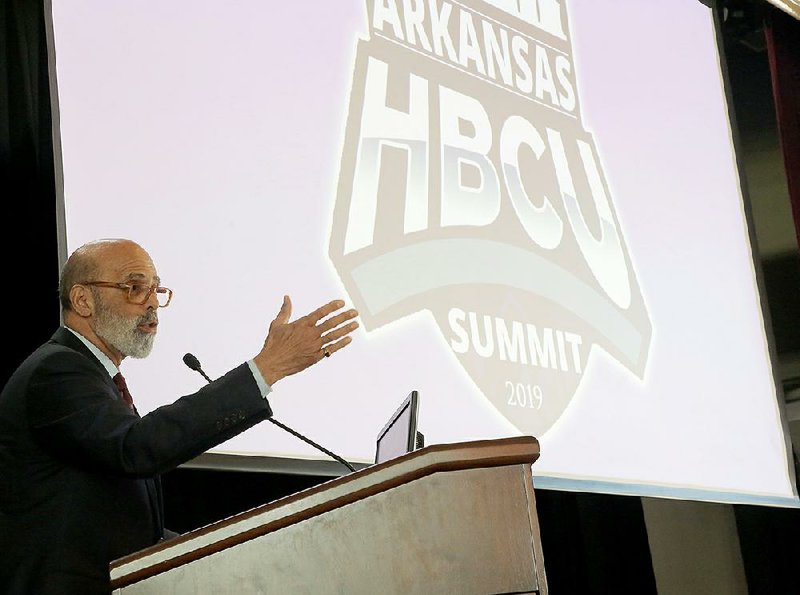Historically black colleges and universities continue to have a powerful impact and are of "vital importance" to Arkansas and the nation, United Negro College Fund President Michael Lomax told a Little Rock audience Monday.
Lomax, a former university president and college literature professor, was a featured speaker at the 2019 Arkansas HBCU Summit, hosted by U.S Rep. French Hill, R-Ark.
Nationwide, there are 101 historically black colleges and universities, including four in the Natural State: University of Arkansas at Pine Bluff; Philander Smith College and Arkansas Baptist College, both in Little Rock; and Shorter College in North Little Rock.
Historically black schools are "punching above their weight," Lomax said, using a sports term sometimes conferred on scrappy, overachieving boxers.
"They hit harder than they would be predicted to from their weight alone," he said. "Given their small average size and given that they have been historically under-resourced, the impact of these unique institutions is significantly greater than one would expect."
The United Negro College Fund has worked for decades to help historically black schools punch above their weight.
With Lomax at the helm, the organization has raised more than $1.5 billion since 2004. It awards more than 10,000 scholarships each year worth more than $100 million.
Since its launch in 1944, the nonprofit group has raised roughly $5 billion.
In his remarks, Lomax said historically black colleges are unleashing the potential of young scholars while also bolstering America's economy.
A study commissioned by the United Negro College Fund estimates that Arkansas' four historically black schools generated $179 million in total economic impact, including 1,920 jobs statewide in 2014. That included 1,109 on-campus jobs. The schools' 701 graduates that year will earn a total of $1.7 billion during their lifetimes, the study calculated.

In an interview, Hill said the state's historically black colleges and universities provide "a powerful education resource and workforce development resource in central Arkansas."
The lawmaker from Little Rock, who serves as vice chairman of the congressional HBCU Caucus, said Monday's gathering was an opportunity to "bring business, academic, nonprofit and governmental resources together to see how we can maximize the use of HBCUs in the local communities."
The event included appearances by Jonathan Holifield, executive director of the White House Initiative on Historically Black Colleges and Universities, Little Rock Mayor Frank Scott Jr. and Gov. Asa Hutchinson.
During his remarks, the governor praised each of the schools, adding, "You make a difference for us."
He also touted the state's support for scholarships.
The Arkansas Scholarship Lottery has provided more than $781 million for scholarships since its inception. That works out to more than 302,000 scholarships awarded to students at 47 universities, colleges and technical schools statewide, its website states.
The program "benefits all of our students, regardless of the school they choose to go to," Hutchinson said. "We want to make sure that that's alive and well, that [it] continues to be able to support the [historically black schools] as well."
Retired Army Col. Nathaniel "Nate" Todd, director of the Arkansas Department of Veterans Affairs, said Arkansas' historically black schools have enriched the state and lifted its people. And they continue to be an important resource.
"We're talking about a vital asset -- human capital," he said. "Any time that we can optimize a person's mind and ability to help our state, that's a good thing."
Laurence Alexander, chancellor of UAPB, portrayed historically black schools as sources of opportunity.
"As we invest in these institutions, they will pay big dividends for the state of Arkansas and for the well-being of our state," he added.
Metro on 04/16/2019
